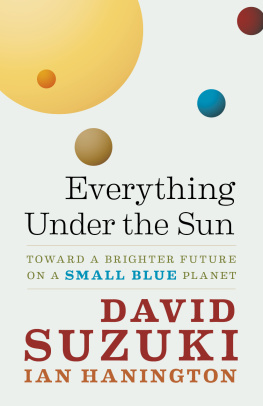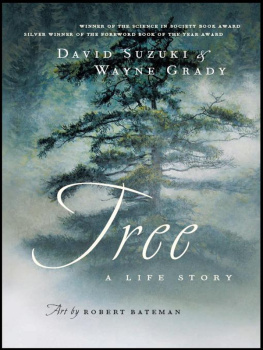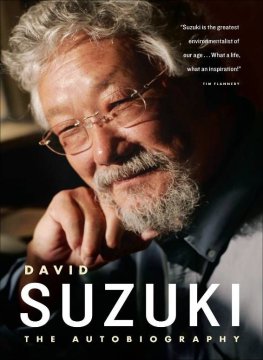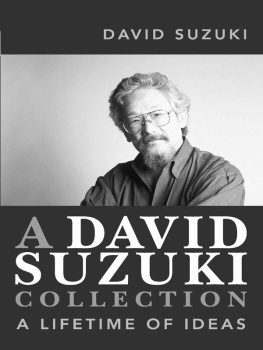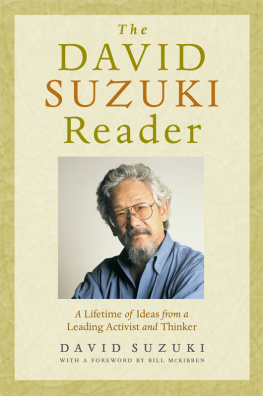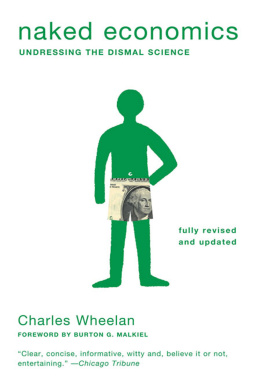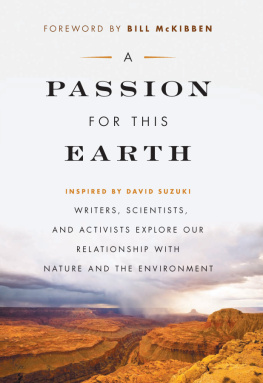FROM NAKED APE TO SUPERSPECIES
from NAKED APE to SUPERSPECIES
humanity and the global eco-crisis
DAVID SUZUKI
HOLLY DRESSEL

Copyright 2004 by Dr. David Suzuki and Holly Dressel
U.S. edition copyright 2005 by Dr. David Suzuki and Holly Dressel
04 05 06 07 08 5 4 3 2 1
All rights reserved. No part of this book may be reproduced, stored in a retrieval system or transmitted, in any form or by any means, without the prior written consent of the publisher or a licence from the Canadian Copyright Licensing Agency (Access Copyright). For a copyright licence, visit www.accesscopyright.ca or call toll free to 1-800-893-5777.
Greystone Books
A division of Douglas & McIntyre Ltd.
2323 Quebec Street, Suite 201
Vancouver, British Columbia
Canada V5T 4S7
www.greystonebooks.com
David Suzuki Foundation
2211 West 4th Avenue, Suite 219
Vancouver, British Columbia
Canada V6K 4S2
National Library of Canada Cataloguing in Publication Data
Suzuki, David, 1936
From naked ape to superspecies: humanity and the global eco-crisis / David Suzuki and Holly Dressel. Rev. ed
Co-published by the David Suzuki Foundation.
Includes bibliographical references and index.
ISBN 1-55365-031-X
1. NatureEffect of human beings on. 2. Human ecology. 3. Social ecology. 4. Renewable natural resources. I. Dressel, Holly Jewell. II. David Suzuki Foundation. III. Title. GF75.S99 2004 304.2'8 C2004-901157-X
Library of Congress information is available upon request.
Editing by Michael Carroll
Cover design by Jessica Sullivan
Printed and bound in Canada by Friesens
Distributed in the U.S. by Publishers Group West
We gratefully acknowledge the financial support of the Canada Council for the Arts, the British Columbia Arts Council, and the Government of Canada through the Book Publishing Industry Development Program (BPIDP) for our publishing activities.
Greystone Books is committed to reducing the consumption of old-growth forests in the books it publishes. This book is one step towards that goal. It is printed on acid-free paper that is 100% ancient-forest-friendly, and it has been processed chlorine-free.
We remember, with admiration and gratitude, the love of
nature that motivated Rachel Carson to write Silent Spring.
She was a role model for generations of writers,
activists and concerned citizens.
H.D. also dedicates this book, with love, to her husband,
colleague and friend, the late Gary Toole.
CONTENTS
ACKNOWLEDGEMENTS
This is a revised, updated and expanded edition of a book we wrote in 1999. From Naked Ape to Superspecies originally grew out of the eight-hour radio series of the same name, which Holly Dressel researched and field-produced and which we wrote together in 1998 for CBC. The book refined the series; it was the culmination of three and a half years of research, travel and thought, of delightful and distressing conversations with hundreds of wonderful and a few frightening people. We would like to express our lasting gratitude to Jane Lewis, the Montreal producer of the series, as well as to our executive producer, Bernie Lucht; and we would especially like to express our deep appreciation to the people at Greystone Books, whose faith in the continuing usefulness of this book has made this new edition possible: Rob Sanders, Chris Labonte, and particularly, our editors, Nancy Flight and Michael Carroll. We also remember with gratitude the people who helped shape the first edition at our former, and now defunct publisher, Stoddart: editors Jennifer Glossop, Marnie Kramarich, Jane McWhitty and especially Angel Guerra.
Lisa Hayden, my secretary at the time, was an enormous help to both authors, and Joel Silverstein completed the demanding task of transcribing hundreds of hours of taped interviews with grace and enthusiasm. Many other people went beyond the call of duty in sending information quickly and without complaint, no matter how often we asked. They include Andy Kimbrell of the International Center for Technology Assessment, everyone at the Sierra Club of Canada, Christine von Weizsaecker of Ecoropa, Beth Burrows of the Edmonds Institute, Danny Kennedy of Project Underground, and particularly Brewster Kneen, publisher of the Rams Horn. We are also especially grateful to the Third World Network.
On a personal level, my collaborator, Holly Dressel, would like to thank the following friends, who kept up with all the issues so brilliantly and tirelessly allowed her to bounce ideas off them, often far into the night: John Hughes and Martha Hughes; Jack Kofman; Gwynne Dyer and Tina Viljoen; and, for his invaluable post-mortems, Jim Latteier. And no such list would be complete without mention of her daughter, Thea; her son, Jack; and all the other friends and family who had to bear the highs and lows of such all-consuming work.
Finally, I want to acknowledge Jim Murray for his years of friendship and patience. He kept me in broadcasting when I wanted to quit and return to the lab, and he deepened my understanding of the human place in the natural world. The generous and uncomplaining support and enthusiasm of Tara Cullis, despite many weeks of absence, can never be fully acknowledged, but I make a meagre gesture of gratitude with a promise to put a lid on any new projects. I thank also Severn and Sarika, for being so supportive even though I was often away when they wanted me to be with them and too often responded, Not now. Ive got to finish this book.
David Suzuki
Vancouver, British Columbia
INTRODUCTION
Each chapter in this new edition contains fresh examples and analyses that update the original arguments. The book also presents a new first chapter that provides an overview of how the world has changed in the five short years since the first edition was published. The grave problems our sources describe in the current structure of Western society, such as its neglect of basic social structures, rapacious attitude towards natural systems and its concentration of resources on global economics and invasive technologies, are reviewed and updated. Within this fresh context, this edition also introduces ideas about what people can do to correct the excesses of material greed and technological optimism that have placed the natural systems that support this planet in increasing peril.
It is not an unusual contention to state that modern Western culture and its underlying belief systems have as their basic goals ever-increasing human populations, rising GDPs and the unlimited fulfillment of all human desires. It is perhaps less usual, in mainstream analyses at least, to maintain that this is the systemic problem that lies at the root of the continuing and dangerous depletion of the natural products and services on which physical life depends. With so much at stake in terms of our increasing loss of the basic materials required for survival, it has become an urgent matter to convince people that we need to reassess the direction in which we are headed. We also need to explore seriously whether, as our leaders so often claim, it really is our only choice.
In the new first chapter in this edition, we assess the extent to which we are still faced with the same or increasing challenges, while highlighting the many areas where significant progress has been made. For example, globalization is no longer a new term that needs to be defined, as was the case in 1999; it has become a rallying cry that has polarized societies and individuals all around the world, and is now seen as one of the major issues of our time. We now have even graver political and military destabilization in the Middle East and the Third World than we did five years ago, as countries such as the United States, Britain, Japan and Canada try to move into these areas in order to exploit increasingly scarce natural commodities like oil, forests and gold. Real wars are now increasingly present in our lives as new flashpoints such as Iraq, Afghanistan, North Korea and Liberia have joined existing trouble spots like Israel, sub-Saharan Africa and the Balkans.
Next page

